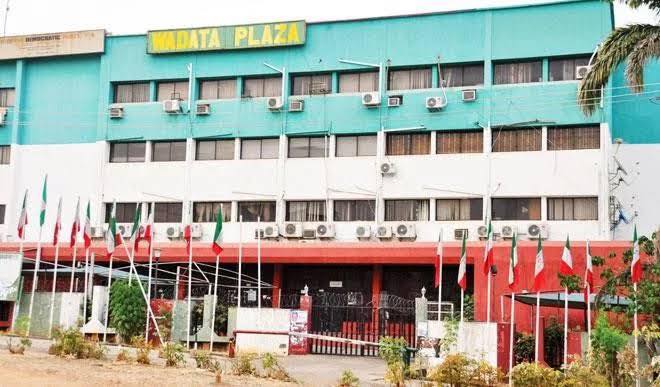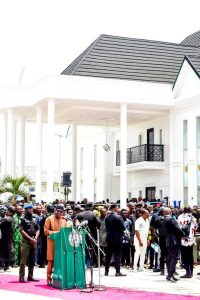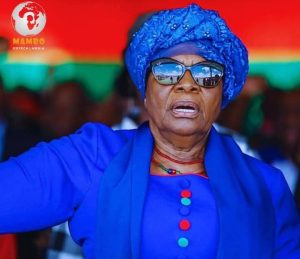FCT Minister Nyesom Wike Orders Sealing of PDP National Secretariat, INEC, CBN, NNPC, and Others Over Unpaid Ground Rent
In a sweeping and unprecedented move that has rattled the political and institutional establishments in Nigeria, the Minister of the Federal Capital Territory, Nyesom Wike, has ordered the immediate sealing of several prominent properties in Abuja. These include the national secretariat of the Peoples Democratic Party (PDP), the Central Bank of Nigeria (CBN), the Independent National Electoral Commission (INEC), the Nigerian National Petroleum Corporation (NNPC), and others. This action is part of an aggressive recovery and enforcement campaign over the non-payment of statutory ground rent.
According to the Federal Capital Territory Administration, the decision follows the revocation of 4,794 land titles belonging to individuals, corporate entities, government agencies, and state governments that have failed to pay their ground rent for periods ranging from ten to forty-three years. The enforcement, which begins Monday, May 26, 2025, will see FCTA task force teams accompanied by security operatives take physical possession of these properties.
The affected institutions include the Central Bank of Nigeria, the Independent National Electoral Commission, the Peoples Democratic Party, the Nigerian National Petroleum Corporation, Conoil Plc, MRS Investment Company Limited, the Kaduna State Government, the Borno State Government, the Nigerian Television Authority, the Niger Delta Development Commission, the Nigerian Ports Authority, the News Agency of Nigeria, the Federal Ministry of Environment, the National University Commission, the Nigerian Postal Service, the Power Holding Company of Nigeria, the Nigerian Security Printing and Minting Company, and the University of Calabar, among others.
YOU MAY READ
Wike Mobilizes Military, Police, and Security Forces for Ministerial Visit, Allegedly Aiming to Spark Crisis and Trigger State of Emergency – nabs Sara-Igbe
The move comes after several notices were issued to land title holders to settle their obligations. FCT officials say most of these entities ignored or failed to act on the final reminders, prompting the minister to approve the revocation and enforcement phase.
The non-payment of ground rent has been a long-standing problem in Abuja, with the FCTA estimating that it is owed over 29 billion naira in accumulated arrears. Ground rent is a statutory obligation that land title holders must pay annually to retain legal possession of property allocated to them. Failure to pay constitutes a breach of title terms and can lead to revocation under the Land Use Act of 1978.
At a press briefing on Saturday, FCT Minister Nyesom Wike stated that the era of impunity was over and that all landowners, regardless of status or political affiliation, must comply with the law.
“We are no longer tolerating the culture of impunity. Abuja is not a dumping ground for abandoned buildings and unpaid debts. The law is clear, and we are here to enforce it. If you owe rent, you must pay. If you don’t, you lose the property,” Wike said.
Among the most controversial targets of this directive is the national secretariat of the Peoples Democratic Party, located at Wadata Plaza in Abuja. The inclusion of the PDP’s headquarters in the revocation and sealing list has triggered political backlash, with party officials accusing the minister of waging a politically motivated vendetta against the opposition.
The PDP National Publicity Secretary, Debo Ologunagba, described the action as an orchestrated attempt to destabilize the party ahead of its convention cycle and preparations for the 2027 general elections.
“This is an orchestrated witch-hunt by Minister Wike to punish the PDP for not aligning with his personal agenda. It is a disgraceful abuse of power. While we believe in financial responsibility, it is suspicious that our secretariat is being sealed just as we gear up for critical political engagements,” Ologunagba said.
However, Wike dismissed the allegation of political bias, insisting that the decision was based strictly on legal grounds and applied uniformly to all defaulters.
“Everybody must respect the law. This has nothing to do with politics. The Central Bank, INEC, and other federal institutions are also affected. This is not about targeting PDP. This is about enforcing compliance and sanitizing Abuja,” he said.
The revocation also affects vital federal agencies such as INEC and the CBN, raising concerns about the possible disruption of essential national functions. Sources within the CBN confirmed that the bank was reviewing the situation and may seek an urgent resolution to avoid a forced closure.
“We are aware of the development and are taking internal steps to resolve the issue. The bank’s operations must continue, and we are engaging with relevant authorities to clarify and rectify the situation,” a senior CBN official told this reporter.
INEC, Nigeria’s electoral body, expressed concern over the implications for its preparations for the 2027 general elections. A senior INEC staff member, speaking on condition of anonymity, said the commission had not received direct notification of impending enforcement and was shocked to see its name on the list.
“If this action is not handled properly, it may interfere with our preparatory activities, especially as we begin early reforms for the next election cycle,” the official warned.
The Nigerian National Petroleum Corporation has not released an official statement, but officials confirmed that its property is among those listed for sealing. There are growing fears that if the enforcement affects operational facilities, it could impact fuel distribution within the FCT.
Several oil companies, including Conoil and MRS Investment Company Limited, have appealed for a grace period and structured repayment plans. The Independent Petroleum Marketers Association of Nigeria (IPMAN) has warned that hasty enforcement may disrupt fuel supply and economic activities.
Academic institutions and parastatals are also on the hook. The University of Calabar, which maintains a liaison office in Abuja, said it was surprised by the development and blamed poor communication between federal agencies and land authorities for the lapse.
“We have always paid statutory charges at our Calabar campus, and we assumed the Abuja property was covered. This is an unfortunate misunderstanding, and we are making efforts to resolve it,” a university spokesperson said.
State governments have also been caught in the net. The Kaduna State Government and the Borno State Government are both listed as defaulters. The Kaduna State Governor’s Office has launched an inquiry into how the situation was allowed to fester since the administration of former Governor Namadi Sambo. Borno State officials have promised quick engagement with the FCTA to settle the matter.
The inclusion of key federal parastatals, state governments, and the national headquarters of a major opposition party has sparked legal and constitutional debate. Some analysts argue that while the FCT Minister has statutory powers to revoke land titles for non-payment of ground rent, the blanket application of these powers to federal institutions may require coordination with the National Assembly and affected ministries.
Legal practitioner and rights advocate, Femi Falana (SAN), noted that the action was lawful but must follow due process and provide affected parties with a fair opportunity to respond.
“For too long, Abuja has been mismanaged. If these properties are seized and converted to productive use or reallocated to compliant entities, we may see a cleaner, more efficient capital. But the rule of law must be respected throughout the process,” Falana said.
The FCTA Executive Secretary for Land Administration, Olushola Odumosu, explained that the enforcement phase was the culmination of a rigorous verification and notification campaign.
“We issued multiple notices and published names in newspapers. This is not an ambush. We followed all legal steps. These entities simply refused to comply. Starting Monday, we will begin sealing the properties. After 30 days, they will be reallocated if no payment or appeal is made,” he said.
As of Saturday evening, affected institutions and title holders were rushing to reconcile their records and make payments. Some have approached the FCTA with evidence of partial compliance, seeking leniency or installment plans.
Meanwhile, Wike’s broader policy direction in the FCT continues to polarize public opinion. While some residents and observers praise his tough approach to sanitation, urban renewal, and revenue generation, others accuse him of heavy-handedness and political overreach.
Since assuming office in August 2023, Wike has launched major road projects, relocated markets, cleared illegal structures, and restructured land administration in the FCT. His administration claims that Abuja’s budgetary independence can only be achieved through fiscal discipline and increased internal revenue generation.
This latest move, however, may prove to be the most consequential test of his urban reform agenda. If successful, it could set a precedent for land use enforcement across Nigeria’s 36 states. If mishandled, it could plunge the capital into political and institutional crisis.
On Monday morning, Abuja residents will witness enforcement teams descend on some of the most iconic structures in the city. The image of government offices, corporate towers, and political secretariats under seal will be a powerful message about accountability—or a controversial show of force, depending on one’s perspective.
For now, the clock is ticking for the 4,794 affected title holders.





